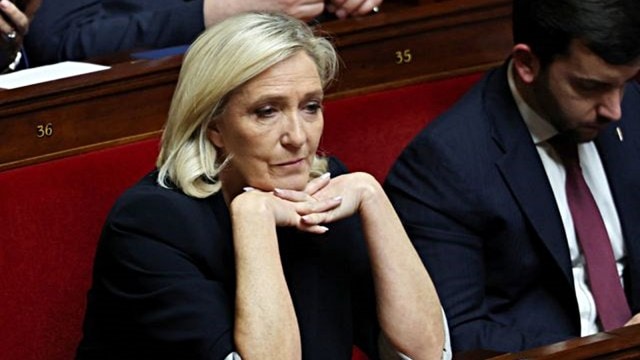Opinion The politics behind Europe’s ‘democratic backsliding’
Democratic backsliding in Europe aligns with the rise of right-wing populist parties and pressure from the Trump administration
 French far-right leader and member of parliament Marine Le Pen, President of the French far-right National Rally (Rassemblement National - RN) party parliamentary group, attends the questions to the government session at the National Assembly in Paris. (Source: Reuters)
French far-right leader and member of parliament Marine Le Pen, President of the French far-right National Rally (Rassemblement National - RN) party parliamentary group, attends the questions to the government session at the National Assembly in Paris. (Source: Reuters) After a French court convicted French far-right leader Marine Le Pen of embezzlement, effectively barring her from running in the 2027 presidential election, there is likely to be anger among the global Right over what its leaders claim to be an interfering role of unelected judges in politics. The right-wing in Europe, however, has itself been accused of causing a “democratic regression” in the continent. A 2025 report by the Civil Liberties Union for Europe (Liberties) highlights this “regression”, based on input from 43 human rights organisations in 21 European Union member states, and is part of an annual series published by Liberties since 2020.
These reports act as “shadow reports” to the European Commission’s (EC) annual Rule of Law reports, which evaluate the democratic health of EU member states. The EC’s reports aim not only to promote and monitor the rule of law across the EU but also to prevent democratic backsliding through its policies. For years, European policymakers focused on the EU’s “democratic deficit”, referring to the lack of direct accountability and limited citizen influence in EU decision-making. In recent years, however, concerns have also grown over the “rule of law” within EU member states.
Since most of the civil society groups in the Liberties report are primarily left-liberal human rights organisations, they are highly critical of the methods employed by some right-wing coalitions in certain EU member states. They have provided a detailed analysis from 21 EU countries on the justice system, anti-corruption measures, media freedom, checks and balances, civic space, and human rights.
In addition to detailed individual country analyses, the report highlights broader trends across the EU. These include political interference in the justice system, lack of transparency, and inadequate protection for whistleblowers in anti-corruption efforts. The report also points to political influence over regulatory bodies, the erosion of democratic and legal checks on governments, and a shrinking civic space. Additionally, human rights are under strain due to stricter migration policies as well as rising discrimination and hate against minorities.
The rule of law is a fundamental value of the European project. It is argued that when a government undermines it, it can abuse power to benefit the ruling party at the expense of the public good. This may lead to corruption, enriching political and business allies, and targeting marginalised groups to consolidate support. A judiciary lacking independence may fail to hold corrupt politicians and businesses accountable.
The report asserts that the ongoing decline of the rule of law in many member states reflects the EU’s weak response to the above-mentioned trends. Initially observed in Hungary and later in Poland, this erosion is now spreading to many countries such as Italy, Slovakia, Romania, Bulgaria, Croatia and even France, Germany, and Sweden. The “democratic recession” in Europe closely coincides with the rise of right-wing political parties across the continent. In Germany, recent elections saw a significant surge in support for Alternative for Germany (AfD), while similar trends are evident in France and Spain. In Italy, Giorgia Meloni now leads the country’s first far-right government since World War II. In Hungary, Viktor Orbán’s far-right Fidesz party has held power for years, while Poland’s Law and Justice Party governed the country for eight years until 2023. Far-right parties are also part of governing coalitions in Finland, Slovakia, Croatia, the Czech Republic, Sweden, and the Netherlands. They have also made strong gains in European parliamentary elections.
Even after World War II, right-wing political parties existed across most European countries but remained largely electorally insignificant. However, over the past two decades, many have moved from the political fringes to the mainstream. As mainstream political parties took moderate or ambiguous stances on immigration, terrorism, multiculturalism, and national sovereignty, right-wing parties responded with clear opposition to the integration of nations, markets, and people. As these parties grew, many centre-right conservative parties began adopting far-right rhetoric on issues like immigration to protect their voter base. This shift lent political legitimacy to the far-right agenda.
European far-right parties portray themselves as defenders of “the people” against “the elites,”. They are also constantly seeking “enemies”. They increasingly collaborate, borrowing rhetoric from one another. The Trump presidency in the United States has further energised these parties. Despite strained transatlantic relations — particularly over the Ukraine peace talks, defence spending, and tariff threats—Trump has forged strong ties with right-wing groups across Europe. Members of the Trump administration, particularly Vice President J D Vance and Elon Musk, have openly supported far-right parties in Europe. During recent German elections, they publicly backed AfD. They also strongly criticised the annulment of Romania’s presidential election, in which a far-right populist had won the first round.
most read
For years, mainstream political parties in Germany, France, and other European countries have worked together to block the far right from gaining power. This strategy, known in France as a cordon sanitaire (firewall), is increasingly under pressure. At the recent Munich Security Conference, J D Vance dismissed the approach, declaring, “There’s no room for firewalls.”
Internal political challenges of the far-right surge and shifting geopolitical landscape are posing a significant threat to European liberal democracies. Interestingly, many far-right and populist leaders express admiration for Russian President Vladimir Putin. This is evident in Russia’s strong ties with Hungary and Slovakia, as well as the Trump administration’s direct negotiations with Russia on the Ukraine war. So, the Liberties report has urged the EU to strengthen its rule of law monitoring and expand its use of infringement procedures and budgetary conditionalities. However, these measures have faced strong resistance in Hungary and Poland and have largely failed to curb democratic backsliding in these countries.
Gulshan Sachdeva is Chief Coordinator, DAKSHIN – Global South Centre of Excellence, at RIS New Delhi and Professor of European Studies at Jawaharlal Nehru University





